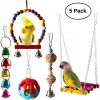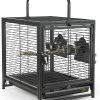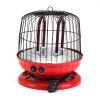Owning an exotic bird can be a thrilling experience due to their unusual appearance or rarity. However, it’s important to recognize that they come with special needs that can be challenging for the average owner, such as requiring ample space, long-term care, and a significant commitment owing to the long lifespans some of them have. Despite these demands, the rewards for raising them include getting an engaging, lifelong hobby as well as a fascinating conversation piece at parties and gatherings.
List of Exotic Birds That Are Kept as Pets
| Name | Length (in) | Weight (oz) | Lifespan (yrs) | Where They Are From |
|---|---|---|---|---|
| Small Exotic Pet Birds | ||||
| African Gray Parrot | 11-13 | 14-19 | 40-60 | Central and West Africa |
| Australian King Parrot | 15-17 | 6.9-9.7 | 25-30 | Eastern Australia |
| Golden Conure | 13-14 | 8.4-9.5 | 20-35 | Northern Brazil |
| Green Aracari | 12-16 | 3.9-5.7 | 15-18 | Northern South America |
| Archangel Pigeon | 11-13 | 9-16 | 7-10 | Europe and the US |
| Big Exotic Pet Birds | ||||
| Palm (or Black Palm) Cockatoo | 22-24 | 32-42 | 40-60 | New Guinea and parts of Australia |
| Hyacinth Macaw | 39-40 | 42-51 | 50-60 | Central and eastern South America |
| Victoria Crowned Pigeon | 29-31 | 72-123 | 30-40 | New Guinea |
| Indian Peafowl | 77-89 (with train feathers) | 140-211 | 22-23 | Indian subcontinent |
It’s important to note that native birds, such as owls and crows, cannot legally be sold or kept as pets.
Ensuring that the dealer selling exotic birds is legitimate is crucial, as illegal activities are common in this market. Scammers often lure buyers with enticing photos of exotic birds, only to demand money transfers without delivering the bird.






